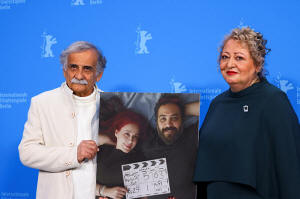|
"We
are forbidden from joining you and watching a movie on the
silver screen that is about love, about life, and also about
freedom, a lost treasure in our country," the directors said in
a statement read to journalists by lead actor Lily Farhadpour,
who was able to attend the news conference alongside fellow star
Esmail Mehrabi.
Starring as Mahin, a 70-year-old woman in Tehran, Farhadpour
drinks wine, dances and holds hands with Mehrabi, who plays
Esmail, as they fall in love in the 97-minute movie.
"We have come to believe that it is no longer possible to tell
the story of an Iranian woman while obeying strict laws such as
the mandatory hijab," the directors wrote in the letter.
Both directors, who brought the film "Ballad of a White Cow" to
Berlin in 2021, were prevented from travelling by Iranian
authorities.
The festival's organizers in a statement on Feb. 1 called for
authorities to reverse their decision.
Iranian officials could not be reached for comment on Friday,
the weekend in Iran, but media reports have said the pair were
subject to travel bans on unspecified grounds.
Farhadpour, who is also a writer and journalist, said "My
Favourite Cake" was filmed before the death of a young Iranian
Kurdish woman in the custody of the country's morality police in
September 2022 triggered protests across Iran.
"All of this is somehow connected and still we made the decision
to film the way we did before the protests," she said, adding
she was drawn to the film because of its depiction of the
reality of women's lives.
"Women don't wear the hijab when they're sleeping, they don't do
the laundry wearing the hijab, and this means in Iranian films,
the characters just aren't close to reality if they have to
adopt this," she said.
(Reporting by Miranda Murray; additional reporting by Dubai
newsroom; editing by Barbara Lewis)
[© 2024 Thomson Reuters. All rights
reserved.]
This material may not be published,
broadcast, rewritten or redistributed.
Thompson Reuters is solely responsible for this content.

|
|




